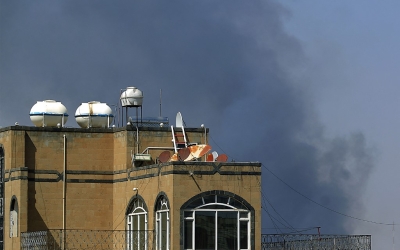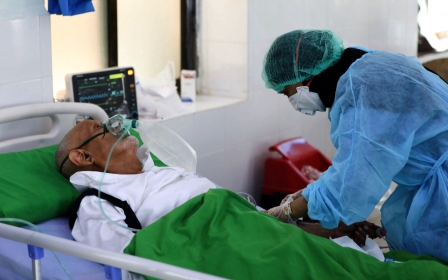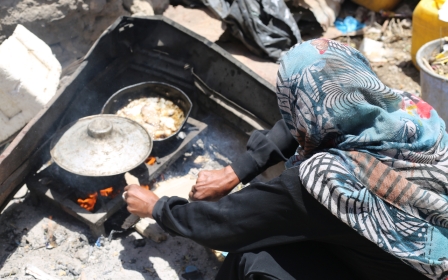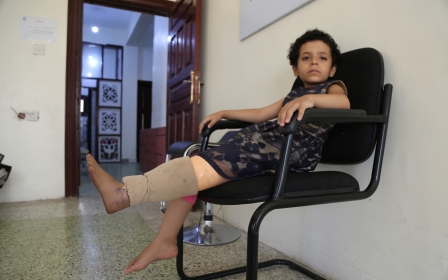'US is complicit': Activists protest against Yemen blockade with hunger strike
Sitting in a grassy field outside the south lawn of the White House, Iman Saleh said she had come to the "belly of the beast" with a simple demand - ending America's complicity in the blockade on Yemen.
Saleh and her fellow activists, all of whom are from the Detroit area, are staging a hunger strike in Washington this week to call for lifting the siege on the war-torn country. After days without food, they looked visibly exhausted but eager to convey their message.
They held banners and Yemeni flags near the White House fence and enthusiastically answered the questions of inquisitive passersby.
"The blockade is violence. It is cruel, inhumane," Saleh said. "We're talking about the biggest humanitarian crisis in the world. This is unmatched. Yemen is already the poorest country in the Arab world and one of the poorest countries in the world. This war blockade sets it further back."
Saudi Arabia and its regional allies, chiefly the United Arab Emirates, started a bombing campaign against Yemen's Houthi rebels in March 2015. The coalition sealed the country to foreign imports except for ships monitored by the UN in the ports of Hodeidah and Saleef.
New MEE newsletter: Jerusalem Dispatch
Sign up to get the latest insights and analysis on Israel-Palestine, alongside Turkey Unpacked and other MEE newsletters
Even then, the kingdom's navy regularly prevents UN-inspected ships from reaching Yemen. Earlier this year, the coalition intensified its blockade by banning fuel shipments for weeks from reaching the country.
'War crime gymnastics'
No fuel whatsoever was allowed through the two ports in February, according to UN data. The Saudi-backed Yemeni government said the coalition eased the fuel restrictions late in March, clearing four ships to unload at Hodeidah.
Activists say the blockade must be lifted unconditionally to prevent the humanitarian situation in Yemen from being used as a bargaining chip in the conflict.
Saleh, a 26-year-old activist, called the fuel blockade "war crime gymnastics".
"They could claim that they're not preventing food and medicine and other necessities from entering the country; they're just stopping fuel. But essentially, you can't transport any of those goods without fuel," she said.
In fact, despite the worsening humanitarian crisis, US envoy for Yemen Tim Lenderking played down the effects of the blockade last month.
"I know you've seen reports in the press lately to the contrary, but in reality, food is consistently arriving at the Hodeidah port, according to data provided by the UN Verification and Inspection Mechanism," Linderking said.
The war has killed more than 230,000 people, caused outbreaks of disease and brought Yemen to the verge of famine, in what the United Nations calls the world's worst humanitarian crisis.
Saleh, general coordinator of the Detroit-based Yemeni Liberation Movement, which is organising the hunger strike, called the US envoy "lying Linderking" for denying the reality and effects of the blockade.
With a keffiyeh pattern mask covering her face, she said: "It's really difficult to push for an end to the war if you're denying that it's even happening."
Linderking is leading Washington's diplomatic efforts to end the conflict.
President Joe Biden announced earlier this year an end to US support for Saudi Arabia's offensive operations in Yemen. But anti-war advocates, including members of Congress, have been calling for clarifications on what that means exactly.
The US administration has repeatedly reaffirmed its commitment to the kingdom's security despite the apparent shift in Yemen policy.
The Houthis have intensified their attacks on Saudi Arabia in recent weeks. Riyadh views the rebels as proxies for Iran, but Houthi officials say the movement does not receive material support or orders from Tehran.
'US is complicit'
Monica Isaac, an organiser participating in the hunger strike, said the definition of "offensive operations" by the US administration is deliberately vague to conceal Washington's involvement in the war and the blockade.
"That's something that's supposed to be the point - that it's not supposed to make sense. That way, it's easier to translate to the public," she said.
With a bullhorn in her hand, Isaac had been chatting with two young men who were interested in the small protest earlier, explaining to them the situation in Yemen.
'The blockade is violence. It is cruel, inhumane'
- Iman Saleh, activist
"The ultimate goal is to end US support for the Saudi-led blockade because we know from that, the war ends," Isaac told MEE. "But within that goal is creating awareness about who the Yemeni people are and what they have been dealing with."
Yemenis have been fighting amongst themselves, with the Saudi-led coalition aiming to restore the government of President Abd Rabbuh Mansour Hadi, who was toppled by the Houthis.
But Yara Beydoun, an activist at the hunger strike, said ending foreign interventions and the blockade are a priority to bring peace to Yemen.
"You have people in Yemen who are fighting, but you also have these huge powers like Saudi Arabia and the US that have tonnes of money and military backing involved. And when you look at it, you just cannot compare it, it's not symmetric," Beydoun told MEE.
"At the end of the day, who's paying? It's the innocent people in Yemen who have nothing to do with anything that's happening. And we are complicit. The US is complicit."
Middle East Eye delivers independent and unrivalled coverage and analysis of the Middle East, North Africa and beyond. To learn more about republishing this content and the associated fees, please fill out this form. More about MEE can be found here.





